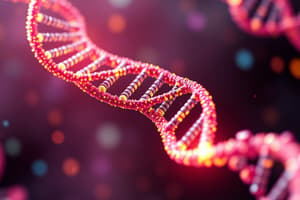Podcast
Questions and Answers
What is the primary function of DNA microarrays in the context of gene analysis?
What is the primary function of DNA microarrays in the context of gene analysis?
- To amplify specific segments of DNA for further analysis.
- To extract nucleic acids from biological samples.
- To analyze individual gene structures in isolation.
- To detect and quantify all expressed genes in an experimental sample. (correct)
Which of the following techniques would NOT be considered a molecular hybridization method?
Which of the following techniques would NOT be considered a molecular hybridization method?
- Dot Blot
- Southern Blot
- PCR (correct)
- Northern Blot
Which method would be most appropriate for functional genomics analysis?
Which method would be most appropriate for functional genomics analysis?
- DNA microarray analysis of expressed genes. (correct)
- Electrophoresis followed by spectrophotometry.
- Molecular cloning of a single gene.
- Standard DNA sequencing of a specific gene.
Which step is essential before conducting genome-wide transcription analysis using DNA microarrays?
Which step is essential before conducting genome-wide transcription analysis using DNA microarrays?
What is a limitation of analyzing genes one by one as mentioned in the content?
What is a limitation of analyzing genes one by one as mentioned in the content?
What is the purpose of having an origin of replication in vectors?
What is the purpose of having an origin of replication in vectors?
Which characteristic is NOT typical of a suitable probe used in molecular hybridization?
Which characteristic is NOT typical of a suitable probe used in molecular hybridization?
In which type of hybridization are the target sequences fixed onto a solid substrate?
In which type of hybridization are the target sequences fixed onto a solid substrate?
Which method is primarily used to evaluate the differential expression of the THR α gene?
Which method is primarily used to evaluate the differential expression of the THR α gene?
What type of analysis is performed to identify other genes involved in the metamorphosis of Xenopus laevis?
What type of analysis is performed to identify other genes involved in the metamorphosis of Xenopus laevis?
What role do antibiotic resistance genes serve in the context of vectors?
What role do antibiotic resistance genes serve in the context of vectors?
Which of the following vectors can be classified as a eukaryotic artificial chromosome?
Which of the following vectors can be classified as a eukaryotic artificial chromosome?
Which technique is NOT used for analyzing the structure of the THR α gene?
Which technique is NOT used for analyzing the structure of the THR α gene?
In molecular hybridization, what ultimately determines the success of probe detection?
In molecular hybridization, what ultimately determines the success of probe detection?
What is the first step in the process of analyzing the THR α gene from Xenopus laevis?
What is the first step in the process of analyzing the THR α gene from Xenopus laevis?
What is a characteristic of multicloning sites in vectors?
What is a characteristic of multicloning sites in vectors?
Which type of nucleic acid extraction method is typically influenced by the nature of the sample?
Which type of nucleic acid extraction method is typically influenced by the nature of the sample?
What does RT-PCR specifically evaluate regarding the THR α gene?
What does RT-PCR specifically evaluate regarding the THR α gene?
Which method involves hybridization directly on tissues without prior extraction?
Which method involves hybridization directly on tissues without prior extraction?
Which technique would be unsuitable for determining the nucleotide sequence of the THR α gene?
Which technique would be unsuitable for determining the nucleotide sequence of the THR α gene?
How are purified DNA/RNA assessed qualitatively before analysis?
How are purified DNA/RNA assessed qualitatively before analysis?
What is the primary function of the Phenol:Chloroform:Isoamyl alcohol solution in the extraction process?
What is the primary function of the Phenol:Chloroform:Isoamyl alcohol solution in the extraction process?
Which of the following is a chaotropic agent commonly used in RNA extraction?
Which of the following is a chaotropic agent commonly used in RNA extraction?
In the context of electrophoresis, which factor significantly affects the migration rate of nucleic acids?
In the context of electrophoresis, which factor significantly affects the migration rate of nucleic acids?
What is the purpose of using acidic phenol in RNA extraction as opposed to basic phenol used in DNA extraction?
What is the purpose of using acidic phenol in RNA extraction as opposed to basic phenol used in DNA extraction?
Which of the following methods is typically used for the qualitative analysis of nucleic acids?
Which of the following methods is typically used for the qualitative analysis of nucleic acids?
What role does ethanol or isopropanol play in the purification of nucleic acids?
What role does ethanol or isopropanol play in the purification of nucleic acids?
What is the main advantage of combining multiple extraction steps in DNA/RNA extraction?
What is the main advantage of combining multiple extraction steps in DNA/RNA extraction?
Which type of matrix is commonly used for the adsorption of DNA/RNA during purification?
Which type of matrix is commonly used for the adsorption of DNA/RNA during purification?
What is the primary function of Taqman probes in real-time PCR?
What is the primary function of Taqman probes in real-time PCR?
How is the initial amount of DNA in a sample determined using qPCR?
How is the initial amount of DNA in a sample determined using qPCR?
What role does the quencher fluorophore play in a Taqman probe?
What role does the quencher fluorophore play in a Taqman probe?
What is the significance of the Ct value in real-time PCR?
What is the significance of the Ct value in real-time PCR?
Which component is essential for creating a recombinant vector in molecular cloning?
Which component is essential for creating a recombinant vector in molecular cloning?
What characterizes the fluorescent agents used to label target-specific probes?
What characterizes the fluorescent agents used to label target-specific probes?
What is the primary function of dideoxynucleotides (ddNTPs) in the Sanger sequencing method?
What is the primary function of dideoxynucleotides (ddNTPs) in the Sanger sequencing method?
Which of the following accurately describes DNA binding dyes like SYBrGreen?
Which of the following accurately describes DNA binding dyes like SYBrGreen?
Which method uses antibodies to detect proteins after separation by size on an SDS gel?
Which method uses antibodies to detect proteins after separation by size on an SDS gel?
In molecular cloning, what is the consequence of successfully incorporating an insert into a vector?
In molecular cloning, what is the consequence of successfully incorporating an insert into a vector?
What role do fluorescent dye-labeled ddNTPs play in automatic sequencing?
What role do fluorescent dye-labeled ddNTPs play in automatic sequencing?
What is a significant improvement in automatic sequencing over the traditional method?
What is a significant improvement in automatic sequencing over the traditional method?
In Sanger sequencing, how are the four nucleotide reactions analyzed?
In Sanger sequencing, how are the four nucleotide reactions analyzed?
Which project significantly benefited from improvements in automatic sequencing techniques?
Which project significantly benefited from improvements in automatic sequencing techniques?
What happens to DNA synthesis when a dideoxynucleotide is incorporated?
What happens to DNA synthesis when a dideoxynucleotide is incorporated?
Which feature distinguishes Northern blotting from Southern blotting?
Which feature distinguishes Northern blotting from Southern blotting?
Flashcards
Nucleic Acid Extraction
Nucleic Acid Extraction
The process of extracting genetic material from living organisms, including animal, plant, or microbial tissues.
Electrophoresis
Electrophoresis
Techniques that separate molecules based on their size and charge using an electric current. This is useful for analyzing extracted nucleic acids like DNA and RNA.
PCR (Polymerase Chain Reaction)
PCR (Polymerase Chain Reaction)
A technique used to amplify specific DNA sequences, creating millions of copies. This is crucial for studying genes and their expression.
RT-PCR (Reverse Transcriptase PCR)
RT-PCR (Reverse Transcriptase PCR)
Signup and view all the flashcards
Southern Blotting
Southern Blotting
Signup and view all the flashcards
DNA Sequencing
DNA Sequencing
Signup and view all the flashcards
Northern Blotting
Northern Blotting
Signup and view all the flashcards
DNA Microarray Analysis
DNA Microarray Analysis
Signup and view all the flashcards
Cell membrane lysis
Cell membrane lysis
Signup and view all the flashcards
Chemical lysis
Chemical lysis
Signup and view all the flashcards
Mechanical lysis
Mechanical lysis
Signup and view all the flashcards
Protein elimination
Protein elimination
Signup and view all the flashcards
Phenol:Chloroform:Isoamyl alcohol solution
Phenol:Chloroform:Isoamyl alcohol solution
Signup and view all the flashcards
Electrophoresis gel
Electrophoresis gel
Signup and view all the flashcards
Spectrophotometric analysis
Spectrophotometric analysis
Signup and view all the flashcards
DNA Binding Dyes
DNA Binding Dyes
Signup and view all the flashcards
Target-Specific Probes
Target-Specific Probes
Signup and view all the flashcards
Hydrolysis Probes
Hydrolysis Probes
Signup and view all the flashcards
Hybridization Probes
Hybridization Probes
Signup and view all the flashcards
Molecular Beacon
Molecular Beacon
Signup and view all the flashcards
Taqman Probe
Taqman Probe
Signup and view all the flashcards
Ct (Cycle Threshold)
Ct (Cycle Threshold)
Signup and view all the flashcards
Standard Curve in Real-Time PCR
Standard Curve in Real-Time PCR
Signup and view all the flashcards
Vectors in Molecular Cloning
Vectors in Molecular Cloning
Signup and view all the flashcards
Origin of Replication (Ori)
Origin of Replication (Ori)
Signup and view all the flashcards
Multiple Cloning Site (MCS)
Multiple Cloning Site (MCS)
Signup and view all the flashcards
Antibiotic Resistance Genes
Antibiotic Resistance Genes
Signup and view all the flashcards
Molecular Hybridization
Molecular Hybridization
Signup and view all the flashcards
Probe in Molecular Hybridization
Probe in Molecular Hybridization
Signup and view all the flashcards
Solid Substrate Hybridization
Solid Substrate Hybridization
Signup and view all the flashcards
In Situ Hybridization
In Situ Hybridization
Signup and view all the flashcards
Functional Genomics
Functional Genomics
Signup and view all the flashcards
DNA Microarray
DNA Microarray
Signup and view all the flashcards
Western Blot
Western Blot
Signup and view all the flashcards
Genome-wide Transcription Analysis
Genome-wide Transcription Analysis
Signup and view all the flashcards
Western Blotting
Western Blotting
Signup and view all the flashcards
Sanger Sequencing
Sanger Sequencing
Signup and view all the flashcards
Dideoxynucleotides
Dideoxynucleotides
Signup and view all the flashcards
Automatic Sequencing
Automatic Sequencing
Signup and view all the flashcards
Genome Projects
Genome Projects
Signup and view all the flashcards
Capillary Electrophoresis
Capillary Electrophoresis
Signup and view all the flashcards
Study Notes
Introduction to Molecular Biology Techniques
- Methods used to assess individual gene structure and expression are discussed.
Problem: Amphibian Metamorphosis
- Amphibian metamorphosis is a radical process involving molecular, morphological, and biochemical changes in transforming aquatic larvae into terrestrial animals.
- Thyroid hormones trigger this process, acting via thyroid hormone receptors (encoded by α and β THR genes).
- Understanding the THR genes aid a better understanding of the phenomenon.
- Questions that need to be answered include: what is the structure of THR α gene?, how is it expressed?, and how does it interact with other genes to control metamorphosis?
Methods for Gene Structure and Expression
- Gene Structure: The genetic material from Xenopus laevis is extracted and purified DNA/RNA is analyzed. Electrophoresis and spectrophotometric methods are used to analyze the genes. The THR a gene is isolated and amplified from genomic/mRNA. The gene is then located by Southern blotting and ultimately sequenced to understand its structure.
- Gene Expression: Differential expression of THR a is evaluated using Northern blotting or real-time RT-PCR. The expression is checked over time, location, and amount in various tissues to better understand how it affects the process.
- Other Genes in Metamorphosis: To identify other genes linked to metamorphosis, DNA microarrays are used to identify genes involved in the process.
Nucleic Acid Extraction Methods
- Extraction methods vary depending on the sample type (animal, plant, or microbial) and the nucleic acid being extracted.
- Three steps typically involved:
- Cell membrane lysis: tissues mechanically or enzymatically broken to lyse cell membranes.
- Protein elimination: proteins are denatured (using Phenol/Chloroform/Isoamyl alcohol) and removed by centrifugation or using resins. Acidic phenol is generally used for RNA extraction.
- Obtaining purified nucleic acids: typically involves precipitation using alcohol and/or salt. DNA/RNA may be eluted from silica matrices.
Analysis of Purified Nucleic Acids
- Purified nucleic acids are analyzed for amount and quality (integrity, purity).
- Electrophoresis is used for qualitative analysis while spectrophotometry (measuring optical density) is used for quantitative analysis. Both methods can be used in combination.
Electrophoresis
- Nucleic acids migrate in an electric field towards the positive pole in a semi-solid matrix (agarose or acrylamide).
- The migration rate depends on various factors such as molecule size, gel concentration, voltage, and more.
- Electrophoresis can separate different nucleic acid fragments, identify their size, and quantitatively measure the amount. Agarose gels are frequently used, but acrylamide gels (in sequencing gels) offer higher resolution capacity.
- Fluorescent agents stain and highlight nucleic acid fragments for visualization. Molecular weight markers aid in determining the sizes of fragments.
Spectrophotometric Analysis
- Light absorption by molecules within a solution correlates with the number of molecules present in the solution.
- Spectrophotometers measure light intensity differences before and after it passes through a solution to determine optical density (OD).
- Purines and pyrimidines absorb light maximally at 260 nm.
- Nucleic acids concentration can be calculated using their OD values.
- OD260 values/OD280 ratio can be used to assess DNA purity (low ratio means potential protein contamination).
Enzymes in Molecular Techniques
- Nucleases (exonucleases and endonucleases) digest DNA/RNA fragments.
- Ligases join DNA fragments together.
- Polymerases synthesize DNA/RNA.
- Other enzymes include kinases (adding phosphates to DNA) and phosphatases (removing them).
PCR (Polymerase Chain Reaction)
- A method for amplifying gene copies in vitro.
Molecular Cloning
- Amplifies gene copies in vivo using living cells.
- Often followed by other methods (molecular hybridization or PCR) to isolate a specific gene.
- This method uses vectors—DNA molecules with specific characteristics (origin of replication, restriction sites, markers) to create recombinant vectors to introduce the gene into host cells.
Molecular Hybridization
- Used to detect specific nucleic acid sequences, such as a probe having complementary sequences to the target sequence.
- Probes may be single-stranded DNA, RNA, or oligonucleotide and are chemically or radioisotopically labeled.
- Depending on the location of the target sequence, hybridization may occur in liquid phase, on solid substrates like membranes or directly in tissues.
- The technique is widely used in Southern, Northern, in situ, or microarray analysis.
Southern/Northern Blotting
- Methods for transferring DNA or RNA fragments from electrophoresis gels to a membrane for analysis/hybridization.
- DNA fragments are separated on an agarose gel, then transferred to a membrane, fixed, and hybridized with probes for detection.
- The technique employs probes that can be labeled with radioactive or fluorescent markers.
Western Blotting
- Separates proteins by size on an SDS gel, transfers them to a membrane; and detects specific proteins using antibodies.
- It can be used to detect and measure the amount of a specific protein.
Dideoxy Sequencing
- Method of Sanger to determine DNA sequences.
- Uses dideoxynucleotides (ddNTPs) to terminate DNA synthesis at specific points in the DNA strand. Different fluorescently labeled ddNTPs are used, allowing the sequence to be read using capillary electrophoresis.
DNA Microarray
- Method for genome-wide transcription analysis.
- Known DNA sequences are spotted on a small chip, and mRNAs from experimental samples are hybridized to the DNA chip.
- Gene expression patterns can be seen.
Summary
- Individual gene structure and expression can be determined using sequential or simultaneous methods: qualitative and quantitative analysis based on electrophoresis and spectrophotometry. Molecular cloning; PCR, molecular hybridization (Southern/Northern blot, Dot blot, in situ); DNA Sequencing; and functional genomics (e.g. DNA microarray).
Studying That Suits You
Use AI to generate personalized quizzes and flashcards to suit your learning preferences.




